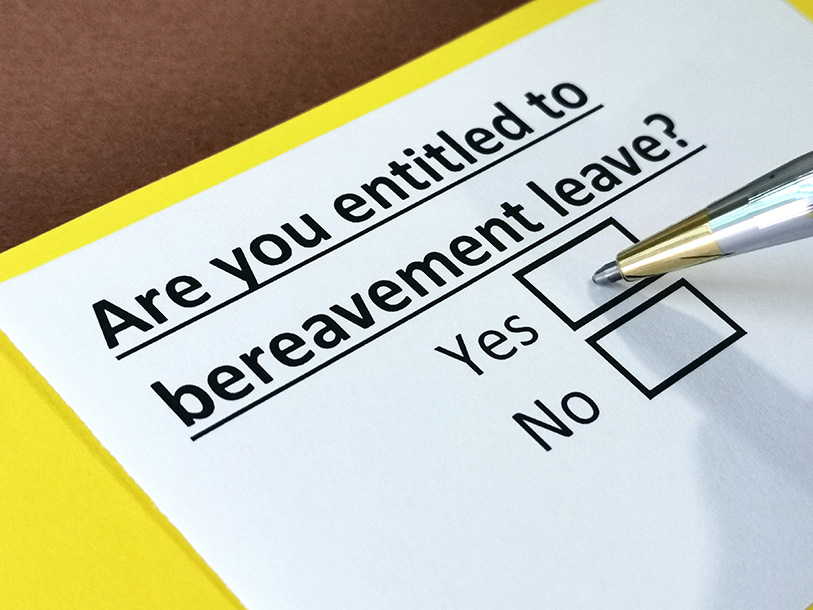What are the requirements of California’s new bereavement leave law?
With 2023 in full swing, many employers are reviewing and updating employee handbooks and policies. The new year should include adopting or updating an existing bereavement leave policy to comply with California’s new bereavement leave law.
Effective January 1, 2023, California requires employers to provide eligible employees with up to five days of leave upon the death of family member. The law applies to all private employers with five or more employees and all public employers. (Government Code Section 12945.7).
Eligibility/Qualifying Family Members
An employee is eligible for bereavement leave if they have been employed for at least 30 days prior to the beginning of the leave. A qualifying family member is a spouse, child, parent, sibling, grandparent, grandchild, domestic partner or parent-in-law as defined in the California Family Rights Act (CFRA). (Government Code Section 12945.7 (a)(1)(3)).
An employee can use bereavement leave for each qualifying occurrence. This means that an employee can take up to five days of bereavement leave for each death of a family member.
Timing of Leave
The five days of bereavement leave do not have to be taken consecutively; leave can be intermittent. However, the employee must complete the bereavement leave within three months of the date of the family member’s death. (Government Code Section 12945.7 (c) (d)).
Documentation Required
An employer can request that an employee seeking bereavement leave provide documentation to support the leave. Documentation may include: death certificate, published obituary, or written verification of death, burial or memorial services from a mortuary, funeral home, burial society, crematorium, religious institution or government agency.
If documentation is requested, an employee must provide it to their employer within 30 days of the first day of leave. Any documentation provided by an employee must be kept confidential and cannot be disclosed, except to internal personnel, legal counsel or as required by law. (Government Code Section 12945.7 (f) (i)).
Payment for Leave
Whether leave is paid or unpaid depends on an employer’s existing bereavement leave policy.
If an employer does not have an existing leave policy, all five days may be unpaid. While on leave, however, an employee is entitled to use vacation, personal leave, accrued and available sick leave, or compensatory time off that is otherwise available to the employee.
If a company has an existing bereavement leave policy, the law requires employers to provide leave according to their policy. If the employer policy provides less than five days of leave, the employer must provide additional bereavement leave so that an employee has no less than five days of bereavement leave.
For example, if an employer’s existing bereavement leave policy provides for three days of paid leave, an employee is entitled to take two additional days of unpaid bereavement leave and may use accrued paid leave for the unpaid days. (Government Code Section 12945.7 (e)).
Collective Bargaining Agreement Exception
The bereavement leave law does not apply to employees who are covered by a valid collective bargaining agreement if the collective bargaining agreement expressly provides for all the following (Government Code Section 12945.7 (k)):
- Bereavement leave equivalent to that provided by this law;
- Wages, hours of work and working conditions of employees;
- Premium wage rates for all overtime worked; and
- A regular hourly rate of pay at least 30% above the state minimum wage.
Anti-Discrimination Requirements
The bereavement leave law prohibits discrimination, interference or retaliation relating to an individual’s exercise of rights to bereavement leave. (Government Code Section 12945.7 (g)(h)).
Employers should review their employee handbooks and policies to ensure that any existing bereavement policies are updated to comply with the new bereavement leave law. If your company does not have a bereavement leave policy, now is a good time to add one to your employee handbook.
Lisa Guzman, Employment Law Expert, CalChamber
CalChamber members can read more about Bereavement Leave in the HR Library. Not a member? Learn about the benefits of membership.
